Artists with the most number-ones on the U.S. Dance Club Songs chart
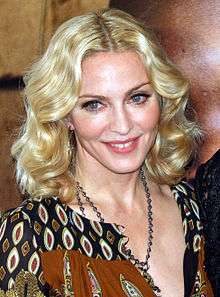
This is a list of artists with the most number-ones on the U.S. Billboard Dance Club Songs chart (12 or more as of 2018). Madonna currently holds the record for the most number-one songs in the 41-year history of the chart, with 46 and is the artist with the most number-ones of any Billboard chart. The only other artists to have achieved more than 20 chart toppers are Rihanna (30) and Beyoncé (22). Janet Jackson has accumulated 19 number-ones during her career, followed by Katy Perry with 18. Mariah Carey and Kristine W are tied with 17, the latter generating the most consecutive number-ones in the chart's history with her first nine singles. Jennifer Lopez and Donna Summer have 16, while Dave Audé, Enrique Iglesias, Lady Gaga, Pitbull, and Kylie Minogue have attained 14 apiece. Three acts have attained thirteen number-one songs: Deborah Cox, Whitney Houston, and Yoko Ono (aka ONO). These artists technically moved up to the ninth place position upon Kristine W’s move into a sixth place tie with Carey.[1] Two artists, Crystal Waters and Martha Wash, are both tied at tenth with 12 number ones, their move came via way of Summer moving into a tie with Lopez in 2018.
First: Madonna (46)

American singer, songwriter, and producer Madonna has achieved a record-extending 46 number-one songs on the U.S. Billboard Dance Club Songs chart. In addition to this feat, she also holds the record for the most chart hits, the most top-twenty hits, the most top-ten hits[2] and the most total weeks at number one.[3] She is the only living and active artist to continue charting at Dance Club Songs, spanning 34 years, the longest of any artist on this chart. In its December 10, 2016 issue celebrating the 40th anniversary of the Dance Club Songs chart, Madonna ranked 1st among the top 100 all-time artists in this category.[4]
Madonna's first two dance chart entries, "Everybody" in 1982 and "Burning Up" in 1983, both peaked at number three. Her first chart-topper came later in 1983, when the double-sided 12-inch single "Holiday"/"Lucky Star" spent five weeks at the summit. This remains as Madonna's longest-running number-one. Her second album Like a Virgin produced three chart-toppers during 1984 — 1985: Like a Virgin", "Material Girl" and "Angel"/"Into the Groove". "Into the Groove", originally recorded for the film Desperately Seeking Susan, was later added to the Like a Virgin album when it was re-issued in non-U.S. territories. "Open Your Heart" and "Causing a Commotion" (from the soundtrack Who's That Girl) were both number-ones in 1987. The remix album You Can Dance topped the club songs chart in 1988 (Billboard policy at the time allowed full albums or EPs to chart). Madonna closed out the 1980s with three more number-ones from her album Like a Prayer: "Like a Prayer", "Express Yourself" and "Keep It Together" (in early 1990).
"Vogue" became Madonna's eleventh dance number-one in 1990, followed by "Justify My Love" in 1991. Her Erotica album produced three more chart-toppers ("Erotica", "Deeper and Deeper" and "Fever"). By the time the Bedtime Stories album spun off two more number-ones ("Secret" and "Bedtime Story"), Madonna had more number-ones than any other artist in the history of the chart. Dance remixes of "Don't Cry for Me Argentina", from the Evita soundtrack, gave Madonna her eighteenth number-one in 1997. In the late 1990s she continued to top the chart with "Frozen", "Ray of Light", "Nothing Really Matters" and "Beautiful Stranger". A cover version of Don McLean's "American Pie" hit number one in 2000.
Madonna's Music album became the first from the artist to produce four number-one dance hits: "Music", "Don't Tell Me", "What It Feels Like for a Girl" and "Impressive Instant". She bested this with her American Life album, with seven singles released during 2002—2004, five of which reached number one ("Die Another Day", "American Life", "Hollywood", "Nothing Fails" and "Love Profusion"). In the midst of this string, Madonna had another chart-topper — her only as a featured artist — on Britney Spears's "Me Against the Music" in 2003. She again produced four chart-toppers from an album, when "Hung Up", "Sorry", "Get Together" and "Jump" (from Confessions on a Dance Floor) became dance number-ones during 2005—2006. A collaboration with Justin Timberlake, "4 Minutes", became Madonna's thirty-eighth number-one in 2008, followed by "Give It 2 Me" (both from the Hard Candy album).
A career retrospective, Celebration, gave her a record-extending 40th number-one ("Celebration"), plus three more during 2012, all from the MDNA album: "Give Me All Your Luvin'" (featuring Nicki Minaj and M.I.A.), "Girl Gone Wild" and "Turn Up the Radio".
Madonna has collected three number-one songs from her thirteenth studio album, Rebel Heart. "Living for Love" became her forty-fourth number-one for the chart issue dated March 7, 2015.[5] Billboard noted that it was a "historic" milestone, as Madonna tied with country singer George Strait for the most number-ones of any Billboard chart, who accumulated the same tally on the U.S. Hot Country Songs chart between 1982 and 2009.[5] "Living for Love" also brought the singer's total amount of U.S. number-ones across all Billboard charts to 173, which includes multiple rankings.[5] "Ghosttown" became her record-breaking forty-fifth chart topper for the issue dated May 30, 2015, breaking her tie with Strait and becoming the act with the most number-one hits on a singular Billboard chart.[6] At the time, Madonna had garnered more number-ones on the chart than Rihanna and Beyoncé combined (45 total).[6] It ascended to the peak with remixes by Don Diablo, Armand Van Helden and Mindskap.[6] "Bitch I'm Madonna" featuring Nicki Minaj became her record-extending forty-sixth chart topper in August 2015.[7] It is Madonna's second collaboration with Minaj to reach the summit, following "Give Me All Your Luvin'" in 2012, and Minaj's fifth song in total to hit number-one.[7]
Second: Rihanna (33)
.png)
Barbadian singer and songwriter Rihanna has achieved 33 number-one songs on the U.S. Billboard Dance Club Songs chart.[8] Rihanna's first number-one song was her debut single "Pon de Replay" in October 2005.[9] It was followed by three number-ones from her second album A Girl like Me; "SOS" in May 2006, "Unfaithful" in July 2006, and "We Ride" in February 2007.[9] Her third studio album, Good Girl Gone Bad spawned four number-ones; the lead single, "Umbrella" featuring Jay-Z, peaked atop the chart for two consecutive weeks, and was followed by "Don't Stop the Music", "Shut Up and Drive" and "Disturbia".[9] Her fourth album, Rated R charted three number one songs: "Russian Roulette", "Hard" featuring Jeezy and "Rude Boy". With "Hard" reaching the top spot, Rihanna logged to shortest time span of reaching ten number-one songs, doing so in four years and five months. However, Lady Gaga broke this record in August 2011, achieving 10 in just two years, five months and three weeks.[10]
Rihanna's fifth album, Loud, garnered three number-ones: "Only Girl (In the World)", "S&M" and "California King Bed".[9] In between the release of "Only Girl (In the World)" and "S&M", "Who's That Chick?", a song by David Guetta on which Rihanna features, became her thirteenth chart topper in February 2011.[9] Rihanna's sixth studio album, Talk That Talk, once again produced three number-one songs; "We Found Love" featuring Calvin Harris peaked atop the chart for two consecutive weeks, and "You da One" and "Where Have You Been" in February and June 2012, respectively.[9] "Diamonds", the lead single from Rihanna's seventh studio album Unapologetic, gave the singer her nineteenth number-one song in December 2012, placing her in joint second place with Janet Jackson.[9]
"Right Now", featuring Guetta, became Rihanna's twentieth number-one in August 2013, breaking her tie with Jackson and putting her alone in the position of second place. It also meant that the singer had collected twenty number one songs in less than eight years.[11] "Right Now" reached the top spot in its sixteenth week on the chart, and ties for the longest climb to the peak position this century, matching "Where Have You Been" as well as "Most Precious Love" by Blaze presents U.D.A.U.F.L. featuring Barbara Tucker.[11][12] "What Now" became her twenty-first chart-topper in November 2013.[13] "Can't Remember to Forget You", a song by Shakira on which Rihanna features, became her twenty-second in total; it became only the second time whereby she was not the lead artist, the other being "Who's That Chick?".[14] Rihanna's "Bitch Better Have My Money" became her twenty-third chart topper in June 2015.[15]
"Work" featuring Drake became her twenty-fourth hit in April 2016, giving her a number-one song in each of the previous seven calendar years.[16] It also meant that the singer had topped the chart in eleven of the previous twelve years.[16] Between "Pon de Replay" and "Work", Rihanna had tallied more number-ones than any other artist, besting Beyoncé with 20, Katy Perry with 15 and Madonna with 13.[16] Rihanna earned her twenty-fifth hit with Calvin Harris' song "This Is What You Came For" on which she features in July 2016.[17] It topped the chart for two consecutive weeks,[18][19] and Billboard noted that the track did not rely on remixes to perform well on the chart.[17]
The second and third singles from Anti, "Kiss It Better" and "Needed Me", both topped the chart.[20][21] The former became her twenty-sixth hit in August 2016 and made her the only act in 2016 to have least three number-one's and also the first lead act in the history of the chart to have two songs in the top three due to "Needed Me" charting at number three the same week.[21] Kylie Minogue has previously had two songs in the top three, with her songs "Better than Today" and the Taio Cruz song "Higher" in March 2011, however the latter track was with Minogue as a featured artist.[21] Additionally, Rihanna's previous number-one "This Is What You Came For" had fallen to number 10 the same week, meaning that she had charted three songs concurrently in the top ten for two weeks running; she was also the last artist to do so when "S&M", "What's My Name?" and "Who's That Chick?" were all charting within the top ten during the week ending March 5, 2011.[21]
"Needed Me" was her twenty-seventh number-one song; her fourth hit in 2016, Rihanna is one of only four acts to have charted four number-ones in a calendar year, having previously done so three times (2007, 2010 and 2011), the others being Perry (2014), Lady Gaga (2009 and 2011) and Beyoncé (2009).[20] The fourth single from Anti, "Love on the Brain", became her twenty-eighth number-one song in January 2017,[22] while the non-single track "Sex with Me" became her twenty-ninth three months later.[8] It is also the fifth song from Anti to reach number-one, making it the first album to produce as many since Katy Perry's album Prism throughout 2013–2014.[8] Between "Work" and "Sex with Me" (April 2016-April 2017), Rihanna had achieved six number-one songs while no other artist had achieved more than two in the same time span.[8] "Pose", another non-single track from Anti, topped the chart in July 2017, becoming her thirtieth in total and her sixth from Anti.[23] Billboard chart analyst Gordon Murray noted that Rihanna is closing the gap with Madonna (46), writing that the former has topped the chart seven times since the latter last did so with "Bitch I'm Madonna" featuring Nicki Minaj in August 2015.[23] The following month, in August 2017, "Wild Thoughts" which featured Rihanna topped the dance chart, making her the sole artist to have four number-ones in five calendar years. In January 2018, "Consideration" feat. SZA became the record eighth Anti song to hit number one, surpassing the previous record holder: Perry's Teenage Dream with seven. [24]
Third: Beyoncé (22)
_crop.jpg)
American singer, songwriter and producer Beyoncé has achieved 22 number-one songs on the U.S. Billboard Dance Club Songs chart,[25] and ranks 4th among the top 100 Dance Club Songs artists. Beyoncé claimed her first number one on the chart with her debut single "Crazy in Love" in September 2003, assisted by the Maurice Joshua and Junior Vasquez remixes.[26][27] It was followed by the Calderone & Quayle remix of "Naughty Girl" in June 2004.[28] In 2006, the singer claimed three number-ones on the chart: "Check on It" in March,[29] the Freemasons and Joshua Maurice assisted remixes of "Déjà Vu" in October,[30] and "Ring the Alarm" in December.[31] In 2007, the singer achieved her sixth and seventh number ones, respectively: "Irreplaceable"[32] and her duet with Shakira, "Beautiful Liar", which spent two consecutive weeks atop the chart.[33][34] Beyoncé's third studio album I Am... Sasha Fierce garnered six number one songs: "Single Ladies (Put a Ring on It)",[35] "Diva",[36] "Halo",[37] "Sweet Dreams",[38] "Why Don't You Love Me",[39] and "Video Phone", featuring Lady Gaga.[26]
"Telephone", a song by Lady Gaga featuring Beyoncé, became her thirteenth number one in February 2010.[26][40] Additionally, "Video Phone" became her sixth consecutive number one, a streak which began with "Halo" one year previous, and continued with "Diva", "Sweet Dreams", "Why Don't You Love Me" and "Telephone".[26] I Am...Sasha Fierce became the first album to produce six number-ones between in 2010; Kristine W's album The Power of Music matched this record in 2011. However, Katy Perry broke the record when Teenage Dream produced seven chart toppers over 2010–2012.[41] Beyoncé's fourth studio album 4 generated four number-ones: "Run the World (Girls)",[42] "Best Thing I Never Had",[43] "Countdown",[44] and "Love on Top".[45] At the time of "Love on Top" becoming Beyoncé's eighteenth chart topper, it placed her one ahead of Rihanna, who had achieved 17, and one behind Jackson, who has 19.[46]
"Blow" became the singer's nineteenth number-one in March 2014.[47] In May 2014, "Partition" ascended to the peak position on the chart, becoming Beyoncé's twentieth number one song.[48] With this chart entry, she became just the third singer to amass at least 20 number ones in chart's 38-year history, after Madonna and Rihanna.[49] It also meant that Beyoncé surpassed Jackson for third-most number ones overall.[49] "Pretty Hurts" became her twenty-first number in August 2014;[50] her most recent chart topper is "7/11", her twenty-second number in total. Aside from her solo achievement, Beyoncé also topped the chart three times between 2003 and 2005 with Destiny's Child.[39]
Fourth: Janet Jackson (19)

American singer, songwriter and producer Janet Jackson has achieved 19 number-one songs on the U.S. Billboard Dance Club Songs chart.[25] She also ranks second among the top 100 artists on this chart.
Fifth: Katy Perry (18)

American singer and songwriter Katy Perry has achieved a record-holding streak of 18 consecutive number-one songs on the chart. Her first was "Waking Up in Vegas" in August 2009,[41] which ranked as the second most spun song on the 2009 year-end chart.[51] Perry's third studio album Teenage Dream (2010) and the songs released from it broke multiple records and garnered several notable achievements on the Dance Club Songs chart. It became the first and only album in the history of the chart to produce seven number-one songs.[41] The recorded was previously jointly held by Beyoncé and Kristine W, whose albums I Am... Sasha Fierce (2008) and The Power of Music (2009) had both produced six chart toppers, respectively.[41] The lead and second singles from Teenage Dream, "California Gurls" featuring Snoop Dogg and the title track, became the singer's second and third number-one songs in August and October 2010, respectively.[41] On the 2010 year-end chart, the former finished as the fifth most spun song of the year, while the latter placed at number 34.[52]
A non-single track from Teenage Dream titled "Peacock" became her fourth hit on the chart in December 2010.[41] The streak continued throughout 2011, with subsequent singles "Firework", "E.T." and "Last Friday Night (T.G.I.F.)" all topping the chart.[41] "E.T." ranked as the most spun song in bars and clubs across the United States on the 2011 year-end chart, with "Last Friday Night (T.G.I.F.)" ranking as the sixth most played and "Firework" the nineteenth.[53] In January 2012, "The One That Got Away" became Perry's eighth overall number-one, the record breaking seventh from Teenage Dream,[41] and finished as the twenty-first most played song on the 2012 year-end chart.[54]
Teenage Dream: The Complete Confection (2012), a re-issue of Teenage Dream, spawned two more chart toppers for Perry in May and August 2012 respectively: "Part of Me" and "Wide Awake".[55][56] "Roar", the lead single from Perry's fourth studio album Prism (2013), became her eleventh number-one in October 2013.[57] With this chart entry, Perry tied with Jennifer Lopez for the most consecutive number-one singles, who also had an active streak of 11.[58] Perry broke out of this tie with Lopez when the second single from Prism, "Unconditionally", topped the chart in January 2014, becoming her twelfth.[59] Perry has subsequently continued to extend her own record of consecutive number-songs with each song that she has released since; her thirteenth, "Dark Horse" featuring Juicy J, topped the chart just one month later in February.[59] At the time, Perry tied with Lady Gaga and Whitney Houston for the ninth most number-ones on the chart overall.[59]
Assisted by remixes from Cash Cash and Mark Picchiotti, "Birthday" became her fourteenth consecutive hit in June. As a result, Perry broke out of her tie with Gaga and Houston and entered into a different tie with Lopez, this time for eighth most number-ones overall.[60] "This Is How We Do" became Perry's record-holding fifteenth consecutive and most recent number-one song that November, tying her with Donna Summer.[61][62] Additionally, it became her fourth song to reach number-one in 2014, the most among all acts that year.[62] As a result, Perry became one of only four acts to have achieved four number-one songs in a calendar year in the history of the chart, along with Rihanna, Beyoncé and Gaga.[20] In October 2016, "Rise" became Perry's record extending sixteenth consecutive number-one song.[1] It became her longest span between number-ones, having previously topped the chart in November 2014 with "This Is How We Do", and broke her streak of having achieved at least one chart topper every year between 2009 and 2014.[1] Perry broke out of her tie with Summer, and into another with Kristine W and Lopez for the sixth most leaders.[1] "Chained to the Rhythm" featuring Skip Marley became her seventeenth consecutive number-one in the chart issue dated April 22, 2017, tying her in fifth place with Mariah Carey.[63] It was followed by "Swish Swish" featuring Nicki Minaj in July 2017, becoming her record-extending eighteenth consecutive number-one song, breaking her from her tie in fifth place with Carey, displacing her into sixth, and into sole fifth position.[64] Billboard writer Gordon Murray indicated that the streak may have been broken owing to Perry's previous single "Bon Appetit" featuring Migos reaching a peak of 28.[64]
Joint Sixth (17)
Mariah Carey

American singer, songwriter and producer Mariah Carey has achieved seventeen number-one songs on the chart, and ranks seventh overall among top 100 Dance Club Songs artists in this category. "Someday" became her first in March 1991, which was followed by "Emotions" in November the same year.[65] "Dreamlover" and "Anytime You Need a Friend" from her third studio album Music Box (1993) became Carey's third and fourth chart-toppers in October 1993 and August 1994, respectively.[65] In October 1995, "Fantasy" became her fifth number-one, a position it held for three weeks; it is her only song to have spent more than one week atop the chart.[65] Carey achieved two more number-ones on the chart in the late 1990s; "Honey" in October 1997 and "I Still Believe" in April 1999.[65] In February 2003, remixes by Maurice Joshua, Hex Hector and Full Intention helped "Through the Rain" to become Carey's eighth number-one on the chart, and her first in the 2000s.[65]
Throughout 2005 and 2006, Carey charted four number-one songs from her tenth studio album The Emancipation of Mimi (2005): "It's Like That" (David Morales Remixes),[66] "We Belong Together" (Peter Rauhofer Atlantic Soul Mixes),[67] "Don't Forget About Us" and "Say Somethin'" featuring Snoop Dogg (David Morales Mixes).[65][68] "Don't Forget About Us" ranked as the third most spun song of 2006 on the year-end chart.[69] Throughout 2008 and 2009, Carey gained three more number-ones with "Touch My Body", "I Stay in Love" and "Obsessed".[65] Carey claimed her sixteenth number-one with the single release "Triumphant (Get 'Em)" in October 2012, tying her with Kristine W for fifth most number-ones.[65] Her most recent is "You're Mine (Eternal)" - aided by remixes from Fedde le Grand, Jermaine Dupri and Gregor Salto - which reached the top of the chart in April 2014. It became her seventeenth in total and broke her out of her tie with Kristine W, up until 2018 when the latter attained her seventeenth number one, thus tying Carey once again.[70]
Kristine W
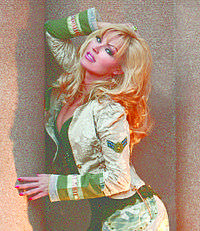
American singer and songwriter Kristine W has achieved seventeen number-one songs on the chart, and ranks eighth among the top 100 Dance Club Songs Artists overall.[71] She first topped the chart with her debut single, "Feel What You Want", in 1994.[71] She followed it up with her second and third hits in 1996: "One More Try" in May[72] and "Land of the Living" in November, which spent two weeks atop the chart.[73][74] Between 2000 and 2005, the singer achieved six more number-ones: "Stronger",[75] "Lovin' You",[76] "Some Lovin'" (Murk vs. Kristine W),[77] "Fly Again",[78] "Save My Soul",[79] and "The Wonder of It All".[80] As a result, Kristine W achieved nine consecutive number-one songs, a record.[81] This streak ended when "I'll Be Your Light" peaked at number two in 2006.[71][81] However, this record was broken by Jennifer Lopez in 2013 who achieved a streak of 11 number-ones,[57] and since has been broken again by Katy Perry, who has achieved a currently unbroken streak of 16.[82] "Walk Away", a song by Tony Moran on which Kristine W features, reached number-one in 2007.[41]
Kristine W's fourth studio album, The Power of Music (2009), became one of only three albums in the history of the chart to produce at least six number-songs, the others being Beyoncé's third studio album I Am... Sasha Fierce (2008) which also achieved six, and Katy Perry's second studio album Teenage Dream (2010), which attained a record holding seven.[41] "The Boss", "Never", "Love Is the Look", "Be Alright", the title track and "Fade" all topped the chart between 2008 and 2011.[41] "The Boss" set a record by being the only song in the history of the chart to reach number-one by three different artists; by the original performer Diana Ross in 1979, and by The Braxtons and Kristine W who covered the song in 1997 and 2008, respectively.[83]
The title track became her fifteenth number-one song, tying her with Mariah Carey for third most chart toppers behind Janet Jackson with 19 and Madonna with 40 (at the time), as well as her sixth consecutive number-one since "I'll Be Your Light".[81] In an interview with Billboard, the singer commented on being one of four artists to have achieved the most number-ones: "I am so honored to be in the company of these amazing women. They are so talented."[81] "Fade" became her sixteenth and most recent number-one song in June 2011 - as well as her sixth from the album - breaking her tie with Carey and assuming sole third position for the most hits behind Jackson and Madonna, at the time of charting.[71] In 2018, Kristine W added her seventeenth number one in the January 27 issue with “Stars.” It also meant that up until this point, 16 of her 18 entries on the chart had reached number-one, the exception being the aforementioned "I'll Be Your Light".[71]
Joint Seventh (16)
Jennifer Lopez
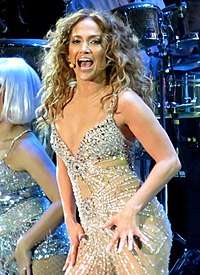
American singer Jennifer Lopez has achieved 16 number one songs on the U.S. Billboard Dance Club Songs chart, and ranked ninth among the top 100 Dance Club Songs Artists in this category. She achieved her first number one in 1999 with the song Waiting for Tonight. She has had 11 consecutive number one singles. Lopez' 2014 single Booty became her 16th number one single, tying her for 7th place with Kristine W, up until the latter moved into a sixth place tie with Mariah Carey in 2018.
Lopez' songs that went number 1 on the chart are Waiting for Tonight, Feelin' So Good, Get Right (L. Vega Remix), Que Hiciste, Hold It Don't Drop It, Do It Well, Fresh Out The Oven, Louboutins, On The Floor, I'm Into You, Papi, Dance Again, Goin' In, Live It Up, First Love and Booty.
5 out of the 16 songs features Pitbull.
Donna Summer
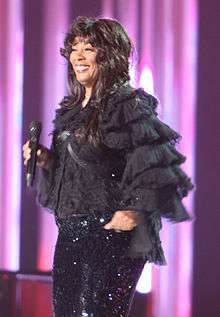
American singer and songwriter Donna Summer achieved 14 number-one songs on the U.S. Billboard Dance Club Songs chart between 1976 and 2010 before dying in May 2012, and ranked sixth among the top 100 Dance Club Songs artists overall. Summer gained her sixteenth number-one posthumously in 2018 with "Hot Stuff 2018". Summer's first two chart-toppers ("Love to Love You Baby" and "Try Me, I Know We Can Make It") occurred in 1975-1976, when Billboard published multiple dance charts that were city-specific. During this time, Billboard rival publication Record World compiled a nationwide dance chart. Noted Billboard statistician Joel Whitburn has since "adopted" Record Worlds chart data from the weeks between March 29, 1975 and August 21, 1976 into Billboards club play history. Billboard columnists, however, only credit Summer with 16 number-ones.
Summer, known widely as the "Queen of Disco", charted several full-length albums on the dance chart, as Billboard policy at the time allowed this (a common practice in the disco era was to segue together several cuts on a side of a vinyl album to replicate a night at a discothèque). In 1977, Summer hit number one with three different albums: Four Seasons of Love, I Remember Yesterday and Once Upon a Time. Her eighth dance chart number-one was "Hot Stuff"/"Bad Girls", two songs that were joined together on her album Bad Girls. These two songs were released separately as singles and both were also number-ones on the Billboard Hot 100. Summer has also hit number one twice with "MacArthur Park" — once in 1978 and again with a remix in 2013; her last number one before her passing was in 2010 with "To Paris with Love." She has had at least one number-one dance hit during the 1970s, 1990s, 2000s, and 2010s.
Joint Eighth (14)
Dave Audé
American musician, remixer, songwriter, and producer Dave Audé has amassed 14 number ones on the Dance Club Songs chart, making him the only producer on this list to achieve this feat, as well as the only non-singing artist on this list, although if you factor in his side project JX Riders, he actually would have 15 due to having topped the chart with his cover of "Sweet Dreams" during the week of September 10, 2016.[84] He joined this threshold during the week of February 25, 2017, when his updated version of the 2006 Bodyrox single "Yeah Yeah," with the song's original vocalist Luciana, reached the top spot. Among his number ones at Dance Club Songs: "Make It Last" (2007), "Grass Is Greener" (with Sisely Treasure) (2009), "Figure It Out" (with Isha Coco) (2010), "Never Forget" (featuring Lena Katina) (2012), "Something For The Weekend" (with Luciana) (2012), Hold Me (with Yoko Ono) (2012), "Electricity & Drums (Bad Boy)" (with Akon & Luciana) (2013), "Take Me Away" (with Rokelle) (2014), "Aftermath (Here We Go)" (with Erasure singer Andy Bell) (2014), "Hustlin'" (with Vassy and Crazibiza) (2014), "Im Gonna Get You" (featuring Jessica Sutta) (2015), "You Have to Believe" (featuring Olivia Newton-John and Chloe Lattanzi) (2015), and "True Original," (featuring Andy Bell) (2016)[85]
In an interview with Billboard, Audé quoted, "I'm thrilled to have hit No. 1 for the 14th time (with "Yeah Yeah 2017"). I'm honored that my original songwriting and production have resonated as strongly as my remixes and am grateful to all of the DJs and music fans who have supported me throughout the years."[86]
Lady Gaga
.jpg)
American singer and songwriter Lady Gaga has achieved fourteen number-one songs, and ranked 16th among the top 100 Dance Club Songs artists in this category. Her first was the second single from her debut album The Fame (2008), "Poker Face", in February 2009.[10][87] She topped the chart three more times in 2009, with "LoveGame" in July,[88] "Paparazzi" in November,[89] and "Bad Romance" in December.[90] "Bad Romance" reached number-one in just four weeks following its debut[91] and spent two consecutive weeks atop the chart.[90][92] At the time, Gaga was one of only three acts to have achieved four number-one songs in a single calendar year, along with Beyoncé (who also achieved four in 2009) and Rihanna.[20]
Throughout 2010, Gaga collected three more number-one songs. Two similarly titled tracks, "Telephone" (featuring Beyoncé) and the remix of "Video Phone" (Beyoncé featuring Lady Gaga) became her fifth and sixth chart toppers in February and May, respectively.[10][26][40][93] "Telephone" topped the chart in its fifth week, becoming Gaga's second fastest ascent to the peak after "Bad Romance" which did so in four weeks.[91] In July, "Alejandro" became her seventh number-one out of only eight appearances; her 2008 debut single "Just Dance" reached a peak of number two.[94][95]
In 2011, Gaga scored four number-one songs in a calendar year for a second time.[20] "Born This Way" and "Judas" became her eighth and ninth chart-toppers in April and June, respectively.[96][97] "The Edge of Glory" became Gaga's tenth number-one on August 13; with this chart entry, Gaga broke the record for logging 10 chart toppers in the shortest time span in just two years, five months and three weeks, and became the twelfth artist in the history of the chart to log at least 10.[10] The record was previously held by Rihanna, who had achieved ten number-ones between 2005 and 2009 in four years and five months.[10] It also meant that Gaga had tallied the most number-ones since "Poker Face" had done so; Beyoncé and Katy Perry had both achieved seven in the same time frame.[10] It was followed up by her eleventh with "Yoü and I" in October.[98]
In January 2012, "Marry the Night" became Gaga's twelfth number-one.[91] The song became the fifth from Gaga's second studio album Born This Way (2011) to top the Dance Club Songs chart and also matched "Telephone" for her second-quickest ascent to the peak following its debut at five weeks.[91] It once again meant that Gaga had logged the most number-one songs on the chart since "Poker Face" did so, although Beyoncé had since increased her tally from seven to nine.[91] "Applause", the lead single from her third studio album Artpop (2013), became her thirteenth to top the chart in October 2013.[99] Gaga's fourteenth and most recent number-one was "Til It Happens to You" in January 2016.[100] A ballad about sexual assault and rape on college campuses in its original form, it was commissioned with nearly 30 remixes from various remixers and producers including Dave Audé, Tracy Young and Dirty Pop, transforming it into a club track.[100] At the time, it placed Gaga in sole tenth position for the most number-ones on the chart.[100]
Enrique Iglesias

With a total of 14 chart toppers, Enrique Iglesias, who is 14th among the top 100 Dance Club Songs Artist overall, is the only male artist with the most number-one songs on the Dance Club Play chart so far, although Dave Audé would tie him in February 2017.[101]
His first entry on this chart was also his first Hot 100 number-one: "Bailamos" in 1999 from his Enrique album. The following year "Be With You" was the second song from that album to hit the top of the chart. In December 2001 "Hero" from his album Insomniac hit number one. "Escape" topped the chart in 2002, followed by "Not In Love", featuring Kelis, in 2004. Five years later he hit number one with "Away" (featuring Sean Garrett). During 2010 he hit number one with "I Like It" (featuring Pitbull). In 2011 both "Tonight (I'm Fuckin' You)" (featuring Ludacris and DJ Frank E) and "I Like How It Feels" (featuring Pitbull and The WAV.s) hit number one. During 2013 "Turn The Night Up" extended his record. "Bailando", featuring Descemer Bueno and Gente de Zona, became his thirteenth number one in 2014. On the week ending September 17, 2016, Iglesias broke out of a three way tie among male artists with the most number ones at Dance Club songs with his second Spanish-language track "Duele el Corazón" featuring Wisin. One of the several "Duele el Corazon" remixes that was played in clubs was also remixed by Audé. When Billboard asked Iglesias about making history on this chart, the Spanish-born singer/songwriter came up with this explanation: "No. 1 on the Dance Chart... And I don't dance. Quite amazing, if you ask me!"[102]
Pitbull
.jpg)
American rapper/singer/producer/songwriter Pitbull became the first rap/hip-hop artist to accumulate the most number ones on the Dance Club Songs chart, having reached the top spot fourteen times in his career, although out the 14 songs, eleven had him as a featured artist: five with Jennifer Lopez (including her alias Lola, and as one of two artists along with Iggy Azalea who share separate collaborations on "Booty"), three with Enrique Iglesias, one with Ricky Martin, and one with Livvi Franc (as his collaboration as a featured artists on her 2009 single "Now I'm That Bitch," for which he also co-wrote, was his first number-one on this chart). He achieved this feat during the week of June 10, 2017, when his featured collaboration with Austin Mahone on the remake of Modjo's "Lady" took the top spot.[103]
Kylie Minogue

Australian singer, songwriter, and actress Kylie Minogue has achieved 14 number-one songs on the U.S. Billboard Dance Club Songs chart, the most of any artist from Australia to date. Although her US chart run began in 1988 with her debut single "I Should Be So Lucky" (which peaked at number 10), it would not be until 2001 when she landed her first number one on the Dance Club Songs chart with "Can't Get You Out of My Head," which also peaked at number 7 on the Hot 100, resulting in her first gold single in the United States. Her nine other number one singles on the Dance Club Songs chart (as a solo artist) included "Love at First Sight" in 2002, "Slow" in 2003, "All the Lovers" and "Get Outta My Way" in 2010, "Better than Today" and "Put Your Hands Up (If You Feel Love)" in 2011, "Timebomb" and "Skirt" in 2013, and "Into the Blue" in 2014. She also has three number one Dance Club Songs singles by way of being a featured artist: "Higher" (with Taio Cruz) in 2010, and in 2015 with "Right Here, Right Now" (with Giorgio Moroder) and "The Other Boys" (with Nervo, Jake Shears and Nile Rodgers).[104] In 2018, Minogue achieved her fourteenth chart topper with "Dancing", the lead single from Golden. The single of course would be her best chart topping placement on any of the international charts so far in 2018.[105]
Joint Ninth (13)
Deborah Cox

Canadian actress, singer, and songwriter Deborah Cox has placed thirteen number ones on the Dance Club Songs Chart, the most among artists from Canada to date. Cox’s history at Dance Club Songs date back to 1995 with "Sentimental", which peaked at number 33, but it would be her 1996 follow up single "Who Do U Love" that would cement her success on this chart when it reached the top spot. Her 13th number one came in 2017 with "Let the World Be Ours Tonight".[106]
Whitney Houston
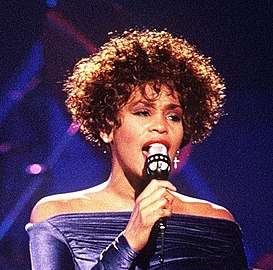
American singer Whitney Houston achieved 13 number-one songs on the U.S. Billboard Hot Dance Club Songs chart between 1987 and 2009 before passing away in February 2012.
Houston's second studio album, Whitney, produced her first three number-one songs on the chart. Her first was with the 12" remix of "I Wanna Dance with Somebody (Who Loves Me)" in July 1987, spending two consecutive weeks at the peak.[107][108] She topped the chart five months later on December 26, with a remix of "So Emotional", which also spent two consecutive weeks atop the chart.[109][110] "Love Will Save the Day" became her third chart-topper in August 1988, and was her last song to reach the peak in the 1980s.[111] In March 1993, Houston returned to the top of the chart with "I'm Every Woman" which spent two consecutive weeks at number one.[112][113][114] On January 29, 1994, "Queen of the Night" became her fifth number one song, and her second to reach the peak from The Bodyguard soundtrack album, following "I'm Every Woman".[115]
Yoko Ono
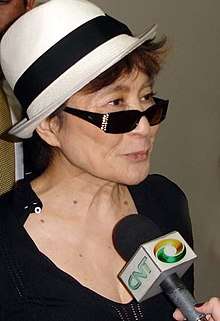
Japanese multimedia artist, singer, songwriter, peace activist, performance artist and filmmaker Yoko Ono can lay claim to being the only artist from Japan, as well as the only Asian artist and the oldest artist on this list (at age 85), to attain the most number ones at Dance Club Songs with 13 chart toppers, as most of her singles were remixes of previously recorded material that she given blessing to remixers and producers under the ONO Project. Ono’s first appearance on this Chart was in 1981 with “Walking on Thin Ice”, which peaked at number 13 but would later see it reached number one twice in 2003 and 2013 under the Ono billing. As of 2017 her remix of “Hell in Paradise” would move her into a tenth place tie on this list. She would also eclipse Giorgio Moroder as the oldest artist to reach number one at Dance Club Songs (Moroder was 76 when his two singles took the top spot in 2015, including the aforementioned collaboration with Minogue).
Joint Tenth (12)
Martha Wash
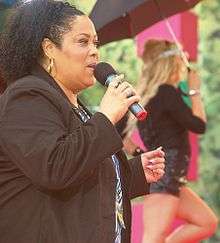
American singer, songwriter, and record executive Martha Wash has a total of 12 number one hits on Billboard's Dance Club Songs chart to date. Her success has earned her the honorific title The Queen of Clubland.[116] Wash, whose music history dates back to 1977 when she and Izora Armstead were the back up singers for Sylvester as Two Tons O' Fun and by 1982 renamed themselves The Weather Girls (whose debut single "It's Raining Men" would be their only number one Dance Club Songs chart topper before disbanding in 1988), would go on to better success as both a solo artist and a featured singer. As a solo artist, her 1993 self-titled album spawned the number one Dance hits "Carry On" and "Give It to You," while "Catch the Light" from her greatest hits album would be her third. The nine other singles would come via way of her work with Black Box ("Everybody Everybody", "Strike It Up," and "I Don't Know Anybody Else," the latter being her first number-one in 1989; Wash later went to court and sued RCA Records and the Italian group because they didn’t acknowledged her as the original singer and placing a person other than Wash on the album cover and videos, eventually leading to a settlement with Wash officially being credited on the act’s singles and album reissues, [117]), C+C Music Factory ("Gonna Make You Sweat (Everybody Dance Now)" and "Do You Wanna Get Funky"), Todd Terry ("Keep on Jumpin'" and "Something Goin' On" alongside Jocelyn Brown) and Tony Moran ("Keep Your Body Working" and "Free People").
Crystal Waters

American singer, songwriter, producer, and actress Crystal Waters has 12 number ones on Billboard's Dance Club Songs chart to date. Her history dates back to 1991, when "Gypsy Woman" became her first chart topper and Hot 100 top ten (peaking at number 8). Credited by Billboard as one of the most successful dance artists of all-time,[118] Waters has placed 6 chart toppers as a solo artist and 6 number-ones as a featured or collaborative artist. Waters latest number-one came in 2018 with "I Am House" (one of three tracks she collaborated with Sted-e & Hybrid Heights, all having reached number one).
See also
References
- 1 2 3 4 Murray, Gordan (October 13, 2016). "Katy Perry Completes 'Rise' to No. 1 on Dance Club Songs". Billboard. Retrieved October 14, 2016.
- ↑ Trust, Gray. "Chart Beat Wednesday: Train, Beyonce, Kings Of Leon". Billboard. Retrieved 2010-02-03.
- ↑ "Madonna Notches 43rd No. 1 on Dance/Club Play Songs". Billboard. Retrieved 2012-08-27.
- ↑ Greatest of All Time Top Dance Club Artists from Billboard (December 1, 2016)
- 1 2 3 "Madonna Notches Historic 44th No. 1 on Dance Club Songs Chart". Billboard. February 19, 2015. Retrieved February 19, 2015.
- 1 2 3 "Madonna Makes History With 45th No. 1 on Billboard's Dance Club Songs Chart". Billboard. May 14, 2015. Retrieved May 14, 2015.
- 1 2 Caulfield, Keith (July 31, 2015). "Madonna Scores 46th No. 1 on Dance Club Songs Chart". Billboard. Retrieved August 1, 2015.
- 1 2 3 4 Murray, Gordon (March 30, 2017). "Rihanna Scores 29th No. 1, & Fifth From 'Anti' Album, on Dance Club Songs Chart". Billboard. Retrieved April 4, 2017.
- 1 2 3 4 5 6 7 Caulfield, Keith (December 3, 2012). "Rihanna Ties Janet Jackson For Second-Most Dance/Club Play Songs No. 1s". Billboard. Retrieved January 24, 2015.
- 1 2 3 4 5 6 Trust, Gary (August 4, 2011). "Weekly Chart Notes: Jimmy Buffett, Lady Gaga, Bill Cosby". Billboard. Archived from the original on September 23, 2016. Retrieved January 24, 2015.
- 1 2 Murray, Gordan (August 5, 2013). "Rihanna Scores 20th No. 1 on Dance/Club Play Chart; Second-Most No. 1s Ever". Billboard. Retrieved January 24, 2015.
- ↑ Murray, Gordan (August 8, 2013). "Rihanna Captures 20th Dance Club No. 1; Lana Del Rey and Cedric Gervais Debut". Billboard. Retrieved January 24, 2015.
- ↑ Trust, Gary (November 4, 2013). "Chart Highlights: Rihanna Tops Dance Club Songs, Young The Giant Returns, Lorde Adds Latin Airplay". Billboard. Retrieved January 24, 2015.
- ↑ Murray, Gordan (March 27, 2014). "Skrillex Debuts at No. 1 on Dance/Electronic Albums Chart". Billboard. Retrieved January 24, 2015.
- ↑ "Chart Highlights: Jason Derulo Jumps to No. 1 on Pop Songs With 'Want to Want Me'". Billboard. June 15, 2015. Retrieved June 15, 2015.
- 1 2 3 Murray, Gordon (April 14, 2016). "Rihanna's 'Work' Rules Dance Club Songs Chart". Billboard. Retrieved September 20, 2016.
- 1 2 Murray, Gordon (June 30, 2016). "Rihanna Earns 25th No. 1 on Dance Club Songs Chart". Billboard. Retrieved September 20, 2016.
- ↑ "Hot Dance Club Songs – July 9, 2016". Billboard. July 9, 2016. Retrieved September 20, 2016.
- ↑ "Hot Dance Club Songs – July 16, 2016". Billboard. July 16, 2016. Retrieved September 20, 2016.
- 1 2 3 4 5 Murray, Gordon (August 11, 2016). "Rihanna Earns 27th No. 1 on Dance Club Songs Chart". Billboard. Archived from the original on September 26, 2016. Retrieved September 20, 2016.
- 1 2 3 4 Murray, Gordon (July 28, 2016). "Rihanna Gets Her 26th No. 1 on Dance Club Songs Chart With 'Kiss It Better'". Billboard. Archived from the original on September 26, 2016. Retrieved September 20, 2016.
- ↑ Murray, Gordon (January 12, 2017). "Rihanna Rules Dance Club Songs With 'Love on the Brain,' Her 28th No. 1". Billboard. Retrieved January 12, 2017.
- 1 2 Murray, Gordon (July 4, 2017). "Rihanna Strikes 30th No. 1 'Pose' Atop Dance Club Songs Chart". Billboard. Retrieved July 4, 2017.
- ↑ Zellner, Xander (February 20, 2018). "Rihanna Scores Record Eighth No. 1 From 'ANTI' on Dance Club Songs Chart". Billboard. Retrieved March 17, 2018.
- 1 2 Murray, Gordon (November 27, 2014). "Wyclef & Avicii Fight AIDS and Find Success on Hot Dance/Electronic Songs Chart". Billboard. Retrieved January 24, 2015.
- 1 2 3 4 5 Trust, Gary (April 28, 2010). "Chart Beat Wednesday: Diva Domination". Billboard. Retrieved January 25, 2015.
- ↑ "Dance Club Songs: Week of September 13, 2003 (Beyoncé, Crazy in Love)". Billboard. September 13, 2003. Retrieved January 25, 2015.
- ↑ "Dance Club Songs: Week of June 5, 2004 (Beyoncé, Naughty Girl)". Billboard. June 5, 2004. Retrieved January 25, 2015.
- ↑ "Dance Club Songs: Week of March 4, 2006 (Beyoncé, Check on Itl)". Billboard. March 4, 2006. Retrieved January 25, 2015.
- ↑ "Dance Club Songs: Week of October 14, 2006 (Beyoncé, Deja Vu)". Billboard. October 14, 2006. Retrieved January 25, 2015.
- ↑ "Dance Club Songs: Week of December 16, 2006 (Beyoncé, Ring the Alarm)". Billboard. December 16, 2006. Retrieved January 25, 2015.
- ↑ "Dance Club Songs: Week of March 10, 2007 (Beyoncé, Irreplaceable)". Billboard. March 10, 2007. Retrieved January 25, 2015.
- ↑ "Dance Club Songs: Week of May 12, 2007 (Beyoncé and Shakira, Beautiful Liar)". Billboard. May 12, 2007. Retrieved January 25, 2015.
- ↑ "Dance Club Songs: Week of May 19, 2007 (Beyoncé and Shakira, Beautiful Liar)". Billboard. May 19, 2007. Retrieved January 25, 2015.
- ↑ "Dance Club Songs: Week of January 17, 2009 (Beyoncé, Single Ladies)". Billboard. January 17, 2009. Retrieved January 25, 2015.
- ↑ "Dance Club Songs: Week of March 28, 2009 (Beyoncé, Diva)". Billboard. March 28, 2009. Retrieved January 25, 2015.
- ↑ "Dance Club Songs: Week of May 23, 2009 (Beyoncé, Halo)". Billboard. May 23, 2009. Retrieved January 25, 2015.
- ↑ "Dance Club Songs: Week of September 12, 2009 (Beyoncé, Sweet Dreams)". Billboard. September 9, 2009. Retrieved January 25, 2015.
- 1 2 Trust, Gary (February 3, 2010). "Chart Beat Wednesday: Train, Beyonce, Kings Of Leon". Billboard. Retrieved January 25, 2015.
- 1 2 "Dance Club Songs: Week of February 27, 2010 (Lady Gaga featuring Beyoncé, Telephone)". Billboard. February 27, 2010. Retrieved January 25, 2015.
- 1 2 3 4 5 6 7 8 9 10 11 Trust, Gary (December 26, 2011). "Katy Perry Notches Record Seventh No. 'One' From 'Teenage Dream' On Dance/Club Play Songs". Billboard. Archived from the original on September 26, 2016. Retrieved July 30, 2014.
- ↑ "Dance Club Songs: Week of July 9, 2011 (Beyoncé, Run the World)". Billboard. July 9, 2011. Retrieved January 25, 2015.
- ↑ "Dance Club Songs: Week of September 10, 2011 (Beyoncé, Best Thing I Never Had)". Billboard. September 10, 2011. Retrieved January 25, 2015.
- ↑ "Dance Club Songs: Week of December 24, 2011 (Beyoncé, Countdown)". Billboard. December 24, 2011. Retrieved January 25, 2015.
- ↑ "Dance Club Songs: Week of April 14, 2012 (Beyoncé, Love on Top)". Billboard. April 14, 2012. Retrieved January 25, 2015.
- ↑ Trust, Gary. "Chart Highlights: Beyonce 'On Top' of Dance/Club Play Songs". Billboard. Retrieved January 25, 2015.
- ↑ "Dance Club Songs: Week of March 22, 2014 (Beyoncé, Blow)". Billboard. March 22, 2014. Retrieved January 25, 2015.
- ↑ "Dance Club Songs: Week of May 17, 2014 (Beyoncé, Partition)". Billboard. May 17, 2014. Retrieved January 25, 2015.
- 1 2 Trust, Gary (May 5, 2014). "Chart Highlights: Beyonce Scores 20th Dance Club Songs No. 1 With 'Partition'". Billboard. Retrieved January 25, 2015.
- ↑ Trust, Gary (August 18, 2014). "Chart Highlights: Sam Smith's 'Stay' Hits No. 1 On Pop Songs". Billboard. Retrieved January 25, 2015.
- ↑ "Best of 2009 – Dance/Club Songs". Billboard. 2009. Archived from the original on September 26, 2016. Retrieved July 31, 2015.
- ↑ "Best of 2010 – Dance/Club Songs". Billboard. Archived from the original on September 26, 2016. Retrieved July 31, 2015.
- ↑ "Best of 2011 – Dance/Club Songs". Billboard. Archived from the original on September 26, 2016. Retrieved July 31, 2015.
- ↑ "Best of 2011 – Dance/Club Songs". Billboard. Archived from the original on September 26, 2016. Retrieved July 31, 2015.
- ↑ "Dance Club Songs: The Week of May 5, 2012". Billboard. May 12, 2012. Archived from the original on September 26, 2016. Retrieved July 31, 2015.
- ↑ "Dance Club Songs: The Week of August 4, 2012". Billboard. August 4, 2012. Archived from the original on September 26, 2016. Retrieved July 31, 2015.
- 1 2 Murray, Gordon (October 17, 2013). "Diplo, Paris Hilton, Lady Gaga Debut On Dance Charts". Billboard. Archived from the original on September 26, 2016. Retrieved July 31, 2015.
- ↑ Trust, Gary (October 14, 2013). "Chart Highlights: Katy Perry, Drake, Bastille Score New No. 1s". Billboard. Archived from the original on September 26, 2016. Retrieved September 23, 2016.
- 1 2 3 Murray, Gordon (February 14, 2014). "Avicii, Katy Perry Make Historic Moves On Dance Charts". Billboard. Archived from the original on September 26, 2016. Retrieved September 23, 2016.
- ↑ Murray, Gordan (June 13, 2014). "Chart Highlights: Katy Perry, Drake, Bastille Score New No. 1s". Billboard. Archived from the original on June 14, 2014. Retrieved September 23, 2016.
- ↑ Murray, Gordon (November 6, 2014). "Dillon Francis On the 'Money' With No. 2 Dance Debut". Billboard. Archived from the original on September 26, 2016. Retrieved August 5, 2015.
- 1 2 Trust, Gary (November 4, 2014). "Chart Highlights: Tove Lo's 'Habits' Hits No. 1 'High' on Pop Songs". Billboard. Archived from the original on September 26, 2016. Retrieved July 31, 2015.
- ↑ Zellner, Xander (April 11, 2017). "Katy Perry Stays in 'Rhythm,' Earns 17th No. 1 on Dance Club Songs Chart". Billboard. Retrieved April 11, 2017.
- 1 2 Murray, Gordon (July 13, 2017). "Another One in the Basket: Katy Perry Nets 18th Club No. 1 With 'Swish Swish'". Billboard. Retrieved April 11, 2017.
- 1 2 3 4 5 6 7 8 Trust, Gary (October 12, 2012). "Mariah Carey Scores Sweet 16th No. 1 On Dance/Club Play Songs". Billboard. Archived from the original on September 22, 2016. Retrieved January 24, 2015.
- ↑ "Dance Club Songs. The Week of May 21, 2005". Billboard. May 21, 2005. Archived from the original on September 23, 2016. Retrieved September 23, 2016.
- ↑ "Dance Club Songs. The Week of August 6, 2005". Billboard. August 6, 2005. Archived from the original on September 23, 2016. Retrieved September 23, 2016.
- ↑ "Dance Club Songs. The Week of May 27, 2006". Billboard. May 27, 2006. Archived from the original on September 22, 2016. Retrieved September 22, 2016.
- ↑ "Dance Club Songs. The Best of 2006". Billboard. Archived from the original on September 22, 2016. Retrieved September 22, 2016.
- ↑ Trust, Gary (April 29, 2014). "Mariah Carey's 'You're Mine' Crowns Dance Club Songs Chart". Billboard. Archived from the original on September 22, 2016. Retrieved January 24, 2015.
- 1 2 3 4 5 Trust, Gary (June 9, 2011). "Weekly Chart Notes: Adele, Eddie Vedder, Kristine W". Billboard. Archived from the original on September 26, 2016. Retrieved September 26, 2016.
- ↑ "Dance Club Songs. The Week of May 25, 1996". Billboard. May 25, 1996. Archived from the original on September 26, 2016. Retrieved September 26, 2016.
- ↑ "Dance Club Songs. The Week of November 19, 1996". Billboard. November 19, 1996. Archived from the original on September 26, 2016. Retrieved September 26, 2016.
- ↑ "Dance Club Songs. The Week of November 23, 1996". Billboard. November 23, 1996. Archived from the original on September 26, 2016. Retrieved September 26, 2016.
- ↑ "Dance Club Songs. The Week of September 9, 2000". Billboard. September 9, 2000. Archived from the original on September 26, 2016. Retrieved September 26, 2016.
- ↑ "Dance Club Songs. The Week of February 2, 2001". Billboard. February 2, 2001. Archived from the original on September 26, 2016. Retrieved September 26, 2016.
- ↑ "Dance Club Songs. The Week of January 25, 2003". Billboard. January 25, 2003. Archived from the original on September 26, 2016. Retrieved September 26, 2016.
- ↑ "Dance Club Songs. The Week of November 29, 2003". Billboard. November 29, 2003. Archived from the original on September 26, 2016. Retrieved September 26, 2016.
- ↑ "Dance Club Songs. The Week of April 17, 2004". Billboard. April 17, 2004. Archived from the original on September 26, 2016. Retrieved September 26, 2016.
- ↑ "Dance Club Songs. The Week of January 22, 2005". Billboard. January 22, 2005. Archived from the original on September 26, 2016. Retrieved September 26, 2016.
- 1 2 3 4 Trust, Gary (March 2, 2010). "The Power Of Kristine W". Billboard. Archived from the original on September 26, 2016. Retrieved August 5, 2015.
- ↑ http://www.billboard.com/articles/columns/chart-beat/7541805/katy-perry-completes-rise-dance-club-songs-chart
- ↑ Bronson, Fred (March 21, 2008). "Chart Beat Chat". Billboard. Archived from the original on September 26, 2016. Retrieved August 5, 2015.
- ↑ "Lindsey Stirling Scores Third No. 1 on Top Dance/Electronic Albums Chart" from Billboard (September 1, 2016)
- ↑ "'Star Wars' Is a Dance Chart Force, Dave Aude Hits Milestone" from Billboard (March 4, 2016)
- ↑ "Luciana & Dave Aude Say 'Yeah' to Topping Dance Club Songs Chart" from Billboard (February 16, 2017)
- ↑ "Dance Club Songs: The Week of February 21, 2009". Billboard. February 21, 2009. Archived from the original on September 23, 2016. Retrieved January 25, 2015.
- ↑ "Dance Club Songs: Week of July 25, 2009 (Lady Gaga, LoveGame)". Billboard. July 25, 2009. Archived from the original on September 23, 2016. Retrieved January 25, 2015.
- ↑ "Dance Club Songs: The Week of November 14, 2009". Billboard. November 14, 2009. Archived from the original on September 23, 2016. Retrieved January 25, 2015.
- 1 2 "Dance Club Songs: The Week of December 26, 2009". Billboard. December 26, 2009. Archived from the original on September 23, 2016. Retrieved January 25, 2015.
- 1 2 3 4 5 Trust, Gary (January 9, 2010). "Chart Highlights: Lady Gaga's 'Marry The Night' Tops Dance/Club Play Songs". Billboard. Archived from the original on September 23, 2016. Retrieved January 24, 2015.
- ↑ "Dance Club Songs: The Week of January 2, 2010". Billboard. January 2, 2010. Archived from the original on September 23, 2016. Retrieved January 25, 2015.
- ↑ "Dance Club Songs: The Week of May 8, 2010". Billboard. May 8, 2010. Archived from the original on September 23, 2016. Retrieved January 25, 2015.
- ↑ "Dance Club Songs: The Week of July 7, 2010". Billboard. July 7, 2010. Archived from the original on September 23, 2016. Retrieved January 25, 2015.
- ↑ Trust, Gary (August 18, 2010). "Lady Gaga: Break Those Records, Baby". Billboard. Archived from the original on September 23, 2016. Retrieved January 24, 2015.
- ↑ "Dance Club Songs: The Week of April 16, 2011". Billboard. April 16, 2011. Archived from the original on September 23, 2016. Retrieved January 25, 2015.
- ↑ "Dance Club Songs: The Week of June 25, 2011". Billboard. June 25, 2011. Archived from the original on September 23, 2016. Retrieved January 25, 2015.
- ↑ "Dance Club Songs: The Week of October 29, 2011". Billboard. October 29, 2011. Archived from the original on September 23, 2016. Retrieved January 25, 2015.
- ↑ "Dance Club Songs: The Week of October 5, 2013". Billboard. October 5, 2013. Archived from the original on September 23, 2016. Retrieved January 25, 2015.
- 1 2 3 Murray, Gordon (January 14, 2016). "Lady Gaga Tops Dance Club Songs With 'Til It Happens to You'". Billboard. Archived from the original on September 23, 2016. Retrieved January 15, 2016.
- ↑ "Chart Highlights: Fergie Returns, Enrique Iglesias Hits No. 1 – October 06, 2014". Billboard. October 6, 2014. Retrieved July 17, 2015.
- ↑ "Enrique Iglesias Celebrates 14th No. 1 on Dance Club Songs Chart -- The Most Among Men" from Billboard (September 7, 2016)
- ↑ "Austin Mahone Earns First No. 1 on Dance Club Songs Chart" from Billboard (May 31, 2017)
- ↑ "DJ Snake Lands 3 Songs in Hot Dance/Electronic Songs Top 10" from Billboard (October 29, 2015)
- ↑ "Kylie Minogue- Chart History". Billboard. Retrieved 31 July 2013.
- ↑ "Deborah Cox Earns 13th No. 1 On Dance Club Songs" from Billboard (September 8, 2017)
- ↑ "Dance Club Songs: Week of July 18, 1987 (Whitney Houston, I Wanna Dance With Somebody)". Billboard. July 18, 1987. Retrieved January 27, 2015.
- ↑ "Dance Club Songs: Week of July 25, 1987 (Whitney Houston, I Wanna Dance With Somebody)". Billboard. July 25, 1987. Retrieved January 27, 2015.
- ↑ "Dance Club Songs: Week of December 26, 1987 (Whitney Houston, So Emotional)". Billboard. December 26, 1987. Retrieved January 27, 2015.
- ↑ "Dance Club Songs: Week of January 26, 1988 (Whitney Houston, So Emotional)". Billboard. January 2, 1888. Retrieved January 27, 2015.
- ↑ "Dance Club Songs: Week of August 20, 1988 (Whitney Houston, Love Will Save the Day)". Billboard. August 20, 1888. Retrieved January 27, 2015.
- ↑ "Dance Club Songs: Week of March 6, 1993 (Whitney Houston, I'm Ever Woman)". Billboard. March 6, 1993. Retrieved January 27, 2015.
- ↑ "Dance Club Songs: Week of March 13, 1988 (Whitney Houston, I'm Every Woman)". Billboard. March 13, 1993. Retrieved January 27, 2015.
- ↑ Whitburn, Joel (2004). Hot Dance/Disco: 1974-2003. Record Research. p. 124.
- ↑ "Dance Club Songs: Week of January 29, 1994 (Whitney Houston, Queen of the Night)". Billboard. January 29, 1994. Retrieved January 27, 2015.
- ↑ Martha Wash: The Most Famous Unknown Singer of the '90s Speaks Out. Rolling Stone. Retrieved on May 17, 2017
- ↑ Philips, Chuck (February 21, 1991). "Read Her Lips : R&B Singer Says Hot Dance Hit Is Lip-Synced - Los Angeles Times". articles.latimes.com. Retrieved January 2, 2016.
- ↑ "Greatest of All Time Top Dance Club Artists". Billboard Music. 27 August 2016. Retrieved 6 July 2018.
39 -- Crystal Waters